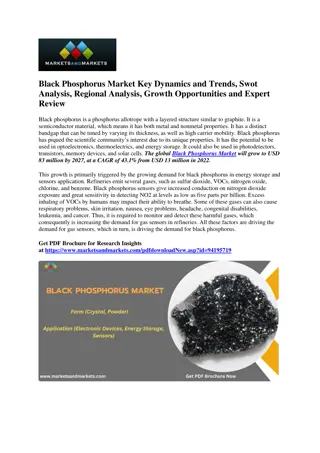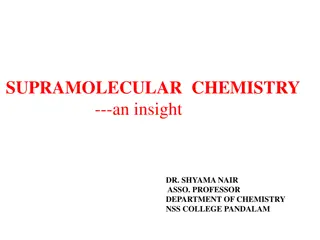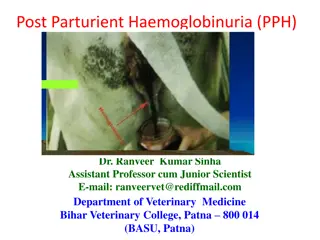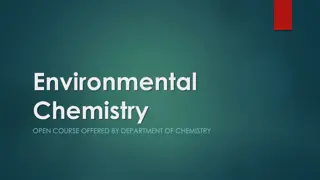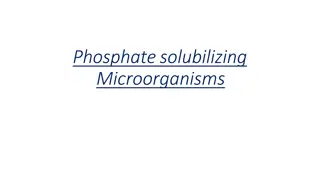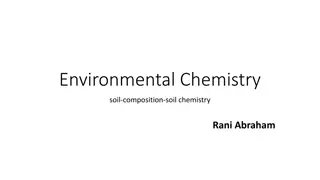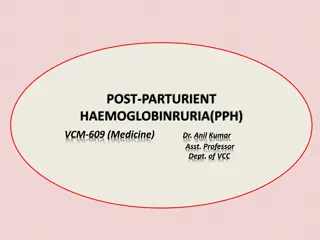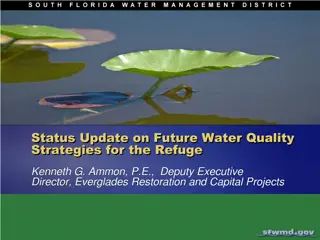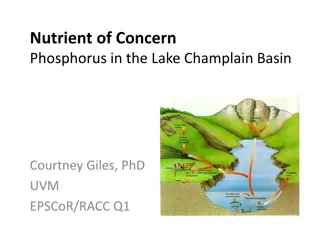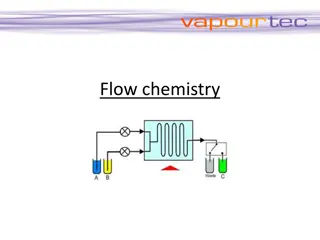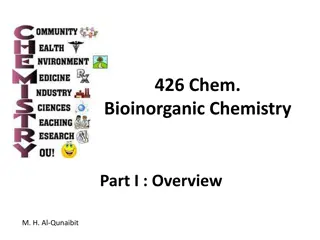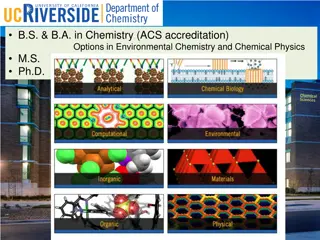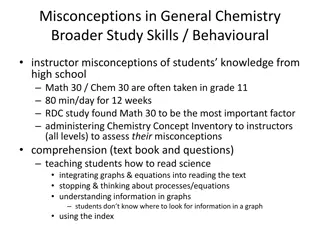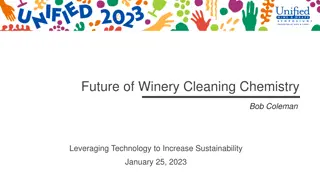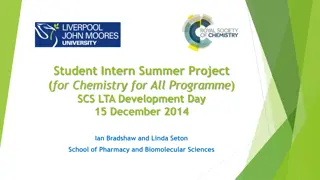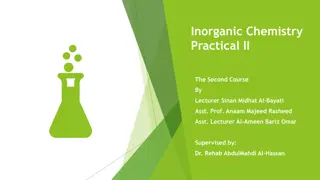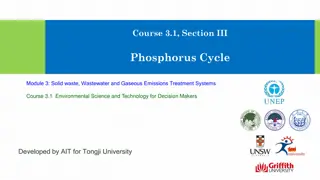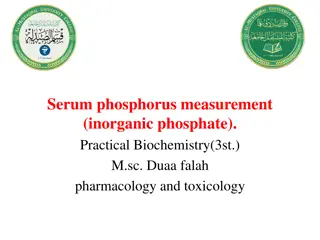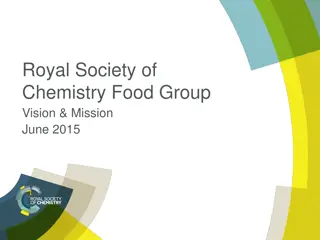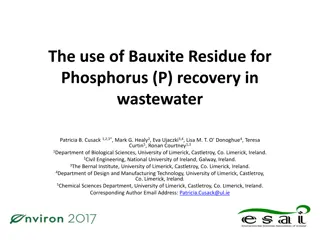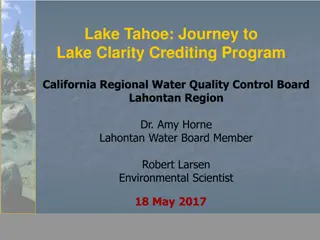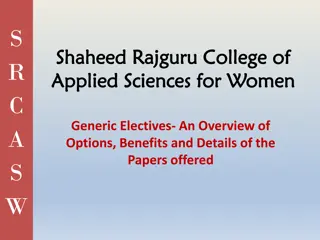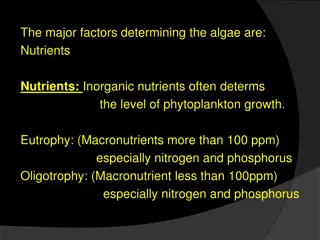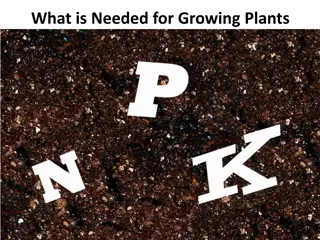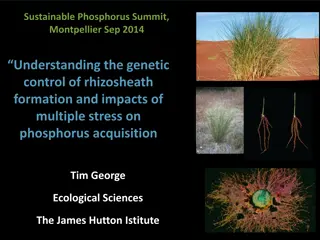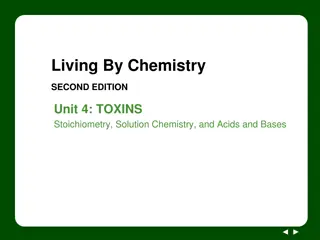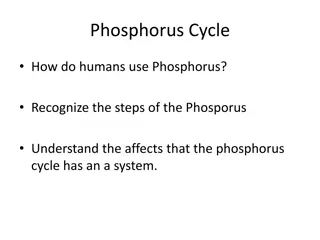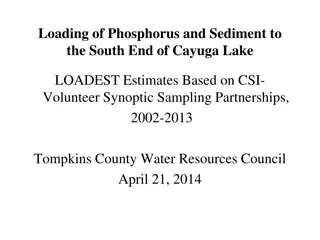Organometallic Chemistry (CHEM 42 1)
Organometallic chemistry delves into compounds with carbon-metal bonds, merging concepts from inorganic and organic chemistry. The field encompasses diverse compounds like ferrocene and tris(triphenylphosphine)rhodium carbonyl hydride, with nomenclature based on naming organic groups and adding meta
1 views • 13 slides
Introduction to Co-ordination Chemistry: Fundamentals and Applications
Explore the fascinating field of coordination chemistry, delving into the complexity of compounds and the coordination bonds that govern their structures. Discover the history, key concepts, and applications of coordination chemistry through a detailed examination of coordination compounds, bonding
13 views • 73 slides
Fuel Your Success Conquer the IB Chemistry (SL and HL) Examination
Ignite your potential and achieve excellence in the IB Chemistry (SL and HL) Examination with our comprehensive study resources. Access practice exams, study guides, and expert guidance to excel in your test. Start your journey towards academic success today!\nClick Here to Get IB-Chemistry Dumps Wi
4 views • 6 slides
North America Leads the Charge in Black Phosphorus Adoption
The black phosphorus market is mainly driven by the increasing demand for gas sensors in critical industries and the implementation of various health and safety regulations globally. The key market players profiled in the report include ACS Material LLC (US), 2D Semiconductors (US), Nanochemazone (
1 views • 3 slides
Exploring Supramolecular Chemistry: Insights and Applications
Supramolecular chemistry delves into the chemistry of molecular assemblies, intermolecular bonds, and non-covalent interactions, leading to the formation of supra-molecules through aggregation of molecular subunits. Concepts like molecular recognition, self-organization, and host-guest chemistry pla
0 views • 18 slides
Post-Parturient Haemoglobinuria (PPH) in Dairy Cows and Buffaloes: Causes and Clinical Manifestations
Post-Parturient Haemoglobinuria (PPH) is a metabolic disease affecting high-producing dairy cows and buffaloes. It is characterized by intravascular hemolysis, hemoglobinuria, and anemia. The condition is mainly caused by phosphorus deficiency, ingestion of certain plants, and increased phosphorus r
0 views • 19 slides
Environmental Chemistry Open Course: Understanding Pollution and Control Measures
Dive into the world of environmental chemistry with this comprehensive open course offered by the Department of Chemistry. Explore the causes, effects, and control measures of air, water, soil, noise, thermal, light, and radioactive pollutions. Gain insights into pollution terminology, water quality
3 views • 9 slides
Harnessing Phosphate-Solubilizing Microorganisms for Sustainable Crop Growth
Phosphorus is crucial for plant growth, but its availability is often limited due to insoluble forms in soil. The use of phosphate-solubilizing microorganisms (PSMs) can help convert insoluble phosphorus into a usable form for plants. This process involves isolating, screening, and mass-producing PS
0 views • 6 slides
Understanding Rickets: Causes, Symptoms, and Pathophysiology
Rickets is a metabolic bone disorder primarily caused by deficiencies in vitamin D, calcium, or phosphorus. This leads to softening and weakening of bones, affecting bone growth and remodeling. Genetic, nutritional, and hormonal abnormalities contribute to this condition, impacting young growing ani
0 views • 16 slides
Understanding Soil Chemistry and Redox Reactions in Environmental Chemistry
Soil chemistry plays a crucial role in sustaining healthy soils by influencing nutrient availability through oxidation and reduction processes. Redox reactions in soil are impacted by factors like oxygen content and water presence, affecting nutrient supplies. The redox status of soil reflects its n
1 views • 92 slides
Understanding Post-Parturient Haemoglobinuria in Dairy Cows
Post-Parturient Haemoglobinuria (PPH) is a metabolic disease affecting high-producing dairy cows after calving, characterized by hemolysis, hemoglobinuria, and anemia. Common in buffaloes and cows, it is caused by phosphorus deficiency in diet, affecting intracellular functions and leading to clinic
0 views • 9 slides
Explore Chemistry with Seymour College - VCE Chemistry Course Overview
Dive into the world of chemistry with Seymour College's VCE Chemistry course. Discover the nature of matter, chemical reactions, design innovation, and carbon compounds. Explore diverse pathways in environmental technology, academia, health sciences, and more. Prepare for a challenging yet rewarding
0 views • 5 slides
Understanding Chemistry through Open-Ended Questions
The content provides a detailed assessment of student responses to open-ended chemistry questions related to hydrogen peroxide and its applications in teeth whitening gels. Various student answers are analyzed based on their understanding of the chemistry concepts involved, with explanations given f
1 views • 18 slides
Future Water Quality Strategies for Refuge Kenneth G. Ammon: Update and Legal History Summary.
State and Federal parties are collaborating to enhance water quality strategies for Refuge Kenneth G. Ammon. Recent legal history highlights phosphorus exceedances and negotiations with stakeholders. Discussions include phosphorus reduction measures to meet a 17 ppb annual flow-weighted mean goal th
1 views • 15 slides
Exploring Phosphorus: History, Distribution, and Impact in the Lake Champlain Basin
Explore the history and significance of phosphorus, a nutrient of concern in the Lake Champlain Basin. From its discovery by Hennig Brand in 1669 to its various uses in fertilizers, detergents, and even warfare, phosphorus plays a critical role in the environment. Discover the global phosphorus pool
0 views • 53 slides
Comprehensive Alignment of MOE Chemistry Syllabus with Khan Academy Resources
This comprehensive alignment showcases the correlation between the Ministry of Education (MOE) chemistry syllabus and the educational resources provided by Khan Academy. It covers various topics in chemistry such as the particulate nature of matter, atomic structure, chemical bonding, stoichiometry,
1 views • 9 slides
Understanding Flow Chemistry for Efficient Chemical Reactions
Flow chemistry, also known as continuous flow or plug flow chemistry, revolutionizes chemical reactions by running them in a continuous flow stream. This dynamic process offers efficient manufacturing of chemical products with precise control over critical parameters like stoichiometry, mixing, temp
2 views • 7 slides
Exploring Bioinorganic Chemistry: Connecting Inorganic and Biochemistry
Bioinorganic Chemistry bridges the gap between inorganic chemistry and biochemistry, understanding the vital role of inorganic elements in living systems. This interdisciplinary field delves into the structure, function, and exploitation of metal ions in biological processes, emphasizing their inter
0 views • 47 slides
UC Riverside Chemistry Program: Excellence in Education and Research
UC Riverside's Chemistry Program offers a range of options in ACS-accredited Chemistry education, with highlights including a distinguished faculty, substantial research funding, and high rankings. The program also boasts a Nobel Prize-winning faculty member and a comprehensive curriculum that cover
0 views • 5 slides
Overcoming Misconceptions in Chemistry Education
Addressing misconceptions in general chemistry education, focusing on student knowledge from high school Math and Chemistry courses. Emphasis on student motivation, learning strategies, and common misconceptions in understanding scientific concepts. Strategies for enhancing comprehension, applicatio
0 views • 12 slides
Innovations in Winery Cleaning Chemistry for Sustainability
Explore the future of winery cleaning chemistry through leveraging technology and sustainable practices. Considerations for chemistry selection focusing on safety, hazardous materials, employee well-being, and environmental impact are highlighted. Current cleaning chemistry practices, including the
0 views • 19 slides
Overview of LJMU Chemistry for All Programme Summer Internship Project
LJMU's Chemistry for All Programme aims to enhance student experiences through summer internships, curriculum development, and outreach activities. The project, funded by the Royal Society of Chemistry, involves a cross-university collaboration to engage local schools and foster interest in chemistr
0 views • 21 slides
Exploring the Chemistry of Phosphorus: White, Red, and Black Phosphorus Forms
Dive into the world of phosphorus chemistry with a focus on its different forms - white, red, and black phosphorus. Learn about the unique properties, structures, and reactions of each form, from the instability of white phosphorus to the thermodynamic stability of black phosphorus. Discover how the
0 views • 16 slides
Understanding the Phosphorus Cycle in Environmental Science
Exploring the intricate processes of the phosphorus cycle, this module delves into how solid waste, wastewater, and gaseous emissions are treated within environmental science and technology frameworks. The discussion covers the distinctive aspects of the phosphorus cycle, its impact on land and wate
0 views • 13 slides
Importance of Calcium and Phosphorus in Animal Nutrition
Calcium and phosphorus are crucial minerals for animal health, with calcium being the most abundant mineral in the body. They play essential roles in nerve impulse transmission, muscle contraction, and bone structure. Deficiencies in these minerals can lead to conditions like rickets, osteomalacia,
0 views • 11 slides
Revisiting Adjustor Curves for Total Phosphorus Removal Rates
Based on a literature review, it was found that a 5th-order polynomial curve is a better fit than the originally used logarithmic trendline for anchor rates of percent Total Phosphorus removal related to runoff depth. The expert panel report reflects the old curves while trendline equations in FAQ d
0 views • 7 slides
Management of Mineral and Bone Disorder in Intensive Hemodialysis Patients
Serum phosphorus levels play a crucial role in cardiovascular risk among hemodialysis patients. Despite relatively unchanged levels over the years, a significant percentage of patients still have elevated phosphorus levels, posing cardiovascular risks. Proper adherence to phosphate binders is essent
0 views • 7 slides
Understanding Serum Phosphorus: Importance, Measurement, and Functions
Serum phosphorus, or inorganic phosphate, plays a vital role in maintaining bone health, energy production, muscle function, and overall cellular health. This mineral is found in various foods and is essential for the normal functioning of the kidneys, bones, muscles, and blood vessels. Phosphate le
0 views • 14 slides
Royal Society of Chemistry Food Group Vision & Mission Summary
The Royal Society of Chemistry Food Group aims to lead, promote, and disseminate the understanding and importance of chemistry in food. Their vision is to enhance food and nutrition security through advancing the chemistry of food ingredients. They strive to engage with various communities to promot
0 views • 4 slides
Understanding Surface Chemistry and Adsorption Phenomena
Surface chemistry is a crucial branch of chemistry that focuses on the chemical processes occurring at interfaces between different surfaces like solid-liquid, solid-gas, and liquid-gas. This field plays a significant role in various industries, including electronics. Adsorption, absorption, and sor
0 views • 15 slides
Utilization of Bauxite Residue for Phosphorus Recovery in Wastewater
This study explores the potential of using bauxite residue, a by-product of the aluminum industry, as an adsorbent for phosphorus recovery in wastewater treatment. With the increasing demand for phosphorus and declining phosphate rock supplies, alternative methods like utilizing bauxite residue coul
0 views • 23 slides
Understanding Lake Tahoe's Environmental Challenges
The Lake Tahoe Total Maximum Daily Load (TMDL) program aims to restore Lake Tahoe's clarity by addressing pollution sources such as nitrogen, phosphorus, and fine sediment particles. The program involves a science phase, regulatory strategy phase, and implementation phase to reduce pollutant loading
0 views • 27 slides
Chemistry 1151K Course Overview and Chapters Summary
Upon completion of the CHEM 1151K course, students will apply the scientific method to investigate chemical questions in allied health, utilize dimensional analysis to solve quantitative problems, communicate effectively using chemical terminology and symbols, describe the behavior of biochemical so
0 views • 44 slides
Biochemistry and Chemistry Elective Courses Overview at SRCASW
The Shaheed Rajguru College of Applied Sciences for Women offers elective courses in Biochemistry and Chemistry. The Biochemistry course covers biomolecules like amino acids, proteins, carbohydrates, lipids, and nucleic acids, emphasizing their properties and functions. It also includes practical ex
0 views • 19 slides
Factors Influencing Algae Growth in Water Ecosystems
Nutrients play a crucial role in algae growth, with inorganic nutrients like nitrogen and phosphorus being key factors. Algae require macroelements such as carbon, hydrogen, oxygen, sulfur, potassium, calcium, phosphorus, and nitrogen in large quantities, as well as microelements like iron, manganes
0 views • 16 slides
The Essentials of Plant Nutrition: Nitrogen, Phosphorus, and Potassium
Plants require a balanced diet of nutrients for growth and development. Nitrogen stimulates above-ground growth, phosphorus enhances root growth and flower formation, while potassium promotes fruit development. However, excessive use of fertilizers can lead to environmental issues like algal blooms,
0 views • 6 slides
Sustainable Phosphorus Summit: Improving Plant P-Use Efficiency for Food Security
Sustainable Phosphorus Summit in Montpellier highlights the necessity of enhancing plant P-use efficiency due to P-deficient soils and environmental concerns. Key traits controlling plant responses to P-deficiency are identified, emphasizing the critical role of phosphorus in agricultural sustainabi
0 views • 28 slides
Understanding Molar Mass and Conversions in Chemistry
Explore the concept of molar mass, moles of atoms, and conversions between mass and moles in chemistry through an engaging lesson on toxins, stoichiometry, solution chemistry, and acids and bases. Learn how to calculate molar mass, describe the magnitude of a mole of a substance, and conduct simple
0 views • 10 slides
Understanding the Phosphorus Cycle and Its Impact on Ecosystems
Humans use phosphorus in various ways, from being a vital component in DNA, RNA, and cell membranes to its role in energy transfer processes. The phosphorus cycle involves steps such as weathering of rocks, phosphate mining for fertilizers, excretion/decomposition, and geologic forces. However, exce
0 views • 8 slides
Estimation Methodology for Phosphorus and Sediment Loading in Cayuga Lake Watershed
Explore the process of estimating phosphorus and sediment loading at the south end of Cayuga Lake using LOADEST methodology. Learn how to combine synoptic monitoring data with USGS flow measurements and run calculations to obtain yearly load numbers. Get step-by-step instructions and access helpful
0 views • 13 slides



